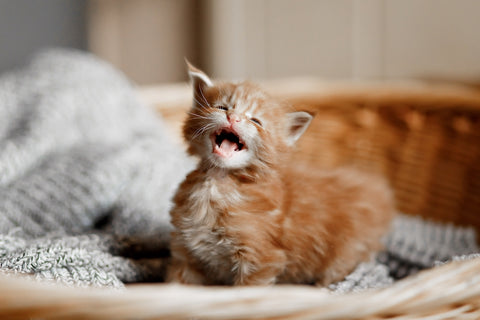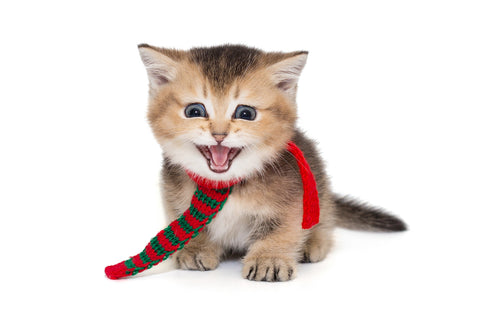When Fluffy Goes Silent: Why Can't My Cat Meow?
Cats are known for their vocalizations, and a cat that suddenly stops meowing can be a cause for concern for any cat owner. While it may be alarming to witness your feline friend go silent, there are several potential reasons behind a cat's inability to meow.
In this blog article, we'll explore some common causes and offer insights into what you can do to address the issue.
Understanding Why Your Cat Isn't Meowing

The Meow: A Versatile Communication Tool
Cats are often thought of as aloof and mysterious creatures, but they are actually quite communicative animals. One of the ways they communicate is through meows. While we may not always understand what they're trying to say, there's no doubt that meows are a versatile tool that can be used to express a wide range of emotions and needs.
According to a study by the University of Sussex, cats use meows to communicate with both humans and other cats. They found that cats use different types of meows depending on who they are talking to. For example, they use a higher-pitched meow when talking to humans, and a lower-pitched meow when talking to other cats.
The study also found that cats use meows to convey a variety of emotions, including happiness, sadness, anger, and fear. They also use meows to request things, such as food or attention.
Here are just a few of the things that cats can communicate with meows:
Happiness: A contented purr-meow is a sure sign that your cat is happy.
Sadness: A low-pitched meow can indicate that your cat is feeling sad or lonely.
Anger: A hiss or a growl followed by a meow can mean that your cat is angry or threatened.
Fear: A scared meow can be high-pitched and accompanied by body language, such as flattened ears and a tucked-in tail.
Request for food: A meow followed by a stare at the food bowl is a clear request for food.
Request for attention: A meow followed by rubbing against your leg is a request for attention.
By paying attention to the context of the meow, as well as your cat's body language, you can start to understand what they are trying to tell you. With a little practice, you may even be able to have conversations with your cat using meows!
Beyond the Meows: The Language of Cats Without Words
Physical Health Issues:
Cats, like humans, can experience health issues that affect their ability to vocalize. A sore throat, respiratory infections, or dental problems can make meowing uncomfortable or even painful for your cat. If your cat has suddenly stopped meowing, a visit to the veterinarian is crucial to rule out any underlying health concerns.
Trauma or Injury:
Cats may lose their voice temporarily due to trauma or injury. If your cat has been involved in an accident or has experienced any physical trauma, it could impact their vocal cords. Similarly, a cat that has been in a fight with another animal may suffer injuries that affect their ability to meow.
Stress and Anxiety:
Cats are sensitive creatures, and stress or anxiety can manifest in various ways, including changes in behavior. If your cat is in a new environment, has recently experienced a major change, or is dealing with an unfamiliar situation, they may become temporarily mute. Creating a calm and secure environment can help alleviate stress and restore their vocalizations.
Behavioral Issues:
Behavioral problems can also contribute to a cat's silence. Attention-seeking behavior, boredom, or a lack of social interaction can lead to changes in meowing patterns. Engaging your cat in interactive play, providing stimulating toys, and spending quality time with them can address behavioral issues and encourage vocalization.
Age-Related Changes:
As cats age, they may experience changes in their vocalization patterns. Some older cats may become quieter, while others may meow more frequently. If your senior cat has stopped meowing suddenly, it's essential to monitor for any accompanying health issues and adapt to their changing needs.
Environmental Factors:
Changes in the environment, such as a move to a new home, the introduction of a new pet, or alterations in the household routine, can impact a cat's meowing behavior. Gradual adjustments and providing a sense of security can help your cat acclimate and regain their voice.
Neurological Conditions:
Rarely, neurological conditions or injuries can affect a cat's vocalization abilities. Issues with the nerves controlling the vocal cords may result in changes to meowing patterns. A thorough examination by a veterinarian, including potential imaging studies, may be necessary to diagnose and address neurological concerns.

Respiratory Infections:
Respiratory infections, such as cat flu or upper respiratory tract infections, can impact a cat's ability to vocalize. These infections may cause congestion or irritation in the throat, leading to a temporary loss of voice. Prompt veterinary care, including appropriate medications, can help alleviate these issues.
Foreign Objects or Obstructions:
Cats are curious creatures that may inadvertently ingest foreign objects or suffer from obstructions in their throat. This can result in difficulty meowing or complete loss of voice. If you suspect your cat has ingested something unusual or is experiencing an obstruction, seek immediate veterinary attention.
Medication Side Effects:
Certain medications may have side effects, and in some cases, loss of voice can be one of them. If your cat has recently started a new medication and you notice a change in vocalization, consult with your veterinarian to explore alternative options or adjust the dosage.
Genetic Factors:
Some cat breeds are naturally less vocal than others. If your cat belongs to a breed known for being quieter, their lack of meowing may simply be a characteristic of their genetics. Understanding your cat's breed-specific traits can provide insights into their natural behavior.
Socialization Issues:
Cats that haven't been adequately socialized during their early development may exhibit shy or withdrawn behavior, including reduced vocalization. Patient and gentle socialization efforts, particularly with kittens, can help them become more comfortable expressing themselves through meows.
In conclusion, the reasons behind a cat's inability to meow can vary widely, ranging from temporary and benign causes to more serious health issues. If you observe any sudden or prolonged changes in your cat's vocalization, behavior, or overall well-being, consulting with your veterinarian is crucial for accurate diagnosis and appropriate intervention. By addressing the underlying cause, you can help your furry friend regain their voice and continue communicating with you in their unique and endearing way.
Leave a comment
